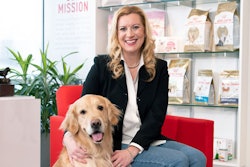
The number of obese or overweight U.S. dogs and cats remained essentially the same in 2018 compared to the previous year, according to the latest report from the Association for Pet Obesity Prevention (APOP). At 55.8 percent for dogs and 59.5 percent for cats in 2018, the rates are still quite high and concerning, but at least they didn’t rise appreciably, as they had for several years in a row.
In addition, pet owner awareness of pet obesity and the associated health risks seems to be growing: 68 percent of pet owners responding to APOP’s annual survey said they had tried to help their pets lose weight. That’s the good news.
The bad news? Many pet owners reported being confused about pet nutrition and obesity, and it seems their veterinarians are not always helpful when it comes to advising about obese pets and weight loss, according to APOP.
Owners 'desperate’ for nutritional advice from vets
“Veterinarians need to offer more obesity treatment options than: Feed less and exercise more,” said Ernie Ward, DVM, APOP president. “The majority of pet owners are overwhelmed with pet food choices and conflicting dietary advice and desperately want help and nutritional recommendations from veterinarians.”
The problem is, veterinarians may be doing the best they can, and clearly that isn’t enough. Unfortunately, there has long been a gap in veterinary education curricula in terms of companion animal nutrition, with many vet students receiving only one course on it. While some vets do undertake additional studies in nutrition and even become board certified in it, or others seek out nutrition information and education from various sources throughout their careers, the number is still relatively small.
Thus a disconnect: In the APOP survey, vets were ranked first for where pet owners receive the best dietary recommendations, yet the owners may have no way of knowing, or don’t know to ask, exactly what veterinarians are basing their recommendations on.
Further, though two-thirds of pet owners surveyed agreed that veterinarians are knowledgeable about pet nutrition, 20 percent disagreed and 13 percent said they don’t know. That may be one reason why “online/internet/website” ranked second as the source for the best dietary recommendations – which is always concerning. Other sources named included pet store, friend, trainer, breeder and groomer, also troubling because those people likely have even less knowledge about pet nutrition than vets do.
Analogy to human medicine and obesity
What’s most worrying: Though 53 percent of pet owners surveyed said their vets discussed their pets’ weight during the annual visit, 19 percent said that happened only occasionally, 20 percent said only when asked and 8 percent said no. Perhaps in some cases falling into the latter three categories, the pets have body condition scores (BCS) rated as thin or healthy weight; but if a pet’s BCS pegs it as overweight or obese, that should be a key item of discussion between the vet and the owner.
I liken this situation to human medicine. My father struggled with his weight most of his adult life, and I remember my mother complaining that his doctor never talked to him about his weight or diet – unless Mom accompanied him on a visit and insisted it be discussed! Yet today, my doctor asks me about my diet and eating habits at nearly every visit, whether an annual wellness check or for a particular health issue.
That’s because, I believe, doctors are becoming more educated about the importance of diet and nutrition as the foundation for good health. With the never-ending humanization of pets, it stands to reason – at least I hope – that veterinarians will eventually understand this connection and veterinary school curricula will catch up.
Of course, whether with humans or pets, compliance is always a challenge. Yet without the knowledge or education behind dietary or weight recommendations, that challenge is only compounded.
















